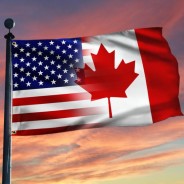A Comparative Dive into US and Canadian Gambling Regulations

Gambling is a whole different animal depending on where you’re placing your bets. Between the US and Canada, the playing field for legal gambling and the regulatory maze you have to navigate There are occasions when we here at ReadyBetGo want to bring you interesting facts about the gambling industry When something catches our eye, we will publish it for your enjoyment.
There are occasions when we here at ReadyBetGo want to bring you interesting facts about the gambling industry When something catches our eye, we will publish it for your enjoyment. 
are like night and day, yet equally fascinating. These two countries are right next to each other but have very different opinions on where, how and why you should be able to gamble. And in the US it’s not just about state lines, it’s about tribal rights, old laws and recent Supreme Court decisions. Meanwhile, Canada takes a more unified but strangely laid-back approach, that’s reflective of the country’s reputation for being orderly and tolerant of risk.
Connecticut Casinos: A Look into US Gaming Laws
Connecticut is a perfect example of how US gaming laws work on multiple levels. The state has two of the most well-known Native American-operated casinos in the country: Foxwoods Resort Casino and Mohegan Sun. They are more than just places to gamble – they are entertainment complexes with hotels, concert venues, restaurants and shopping. Their success is a result of the Indian Gaming Regulatory Act (IGRA) of 1988, which gave Native American tribes the right to establish and regulate gaming on their lands.
Under the agreements with the state, the Mashantucket Pequot and Mohegan tribes pay a percentage of their slot revenue to the state, a deal that has been good for both sides. But it also illustrates the complexity of US gaming laws. In Connecticut these casinos operate in a highly regulated environment, balancing federal tribal law with state oversight. If you want to see this in action for yourself you can explore Connecticut’s casino offerings on Covers.com to get a feel for how these places work.
Connecticut is a perfect example of the balance between tribal sovereignty and state interests in US gaming. It’s a system that allows for giant operations like Foxwoods and adheres to specific agreements – it’s a small sample of how gaming laws across the country are not one size fits all.
Gambling in the USA: A Patchwork of State, Tribal and Federal Jurisdictions
In the US, gambling regulations are a mess, where federal, state and tribal laws overlap, conflict and sometimes even contradict each other. For years, the foundation of American gambling law was the Federal Wire Act of 1961, which was primarily aimed at organized crime rings using gambling to launder money across state lines. This set the stage for a regulatory environment where each state would have to create its own rules, often after years of political fights and legislative wrangling.
Tribal casinos became a big player in US gambling after IGRA was passed in 1988. Since then, these casinos have grown in many states and in many cases have become major tourist destinations and revenue generators for the tribes. Commercial casinos exist mainly in gambling meccas like Nevada and Atlantic City, but Native American-operated casinos have popped up in states like Arizona, Michigan and of course Connecticut. But each state has its own rules about where you can gamble, who can operate and how much money can change hands. New Jersey has some of the loosest laws while Utah bans gambling altogether.
Then came the 2018 Supreme Court decision in Murphy v. NCAA, which basically allowed states to legalize sports betting on their own. After that decision, a wave of legislation rolled out across the country and sports betting started legalizing in various states. Now it’s a big part of the American gambling landscape, but it’s still a patchwork. Nevada is a gambler’s heaven with its lax laws and established industry but states like New York, New Jersey and Illinois are right behind it, each with their own twist and rules.
Gambling in Canada: Provinces in Charge
While the US is stuck in a regulatory quagmire, Canada’s approach to gambling is more provincial and uniform. Here the federal government leaves gambling regulation to each of Canada’s 13 provinces and territories. They’re all allowed to run lotteries, casinos and online gambling sites and the proceeds often go back into the local government coffers to support health, education and public infrastructure. This provincial model means fewer legislative headaches as each province has control over its own gambling landscape.
For Canadians, there is no national restriction like the US’s Wire Act. Instead provincial lotteries like the British Columbia Lottery Corporation or Ontario Lottery and Gaming Corporation have established online gambling platforms for residents to try their luck. Most provinces regulate their own casinos, with some, like Ontario, having big commercial casinos and others having smaller more community-focused models. In British Columbia, for example, casinos operate under the watchful eye of the B.C. Gaming Policy and Enforcement Branch, so there is a level of transparency and regulatory oversight that gives locals a sense of trust in the system.
Plus, Canada doesn’t have a separate framework for Native operated casinos like the US. Instead, Indigenous-owned casinos operate under provincial regulations. These casinos still play a big role in Indigenous communities, providing jobs and revenue without requiring the same level of federal oversight as in the US. This difference in regulatory focus reflects a broader cultural difference, with Canada’s Indigenous casinos operating alongside provincial ones instead of needing their separate legal framework.
Online Gambling: From Gray Areas to Fully Licensed Sites
When it comes to online gambling, the US and Canada are behind the times but Canada is more lenient. Each Canadian province has the right to regulate online casinos and sportsbooks. Ontario has recently opened up its online gambling market to licensed operators from around the world. This means Canadians can access multiple online platforms whereas in the US each state handles online gambling as its own entity. New Jersey, Pennsylvania and Michigan are a few of the states that allow online casinos and poker. But many others only allow online sports betting.
In Canada, as long as you’re on a government-approved site, you’re good to go. In the US, gambling online can feel like navigating a legal minefield, some states allow it and others restrict it heavily. Canadians have more consistency while Americans have a game of chance depending on where they live. And to top it all off Canadian players also avoid the heavy tax burden that Americans have to pay on their winnings—a nice bonus for those who win big.
High Rollers, Different Rules
The gambling worlds of the US and Canada are shaped by their laws and neither is perfect. The US system has endless options, with each state creating its own version of gambling law but that’s also a complexity that can be overwhelming. Canada’s provincial system feels almost civilized in comparison—simple, controlled and comprehensive enough for most players.
Whether you like the US options or Canada’s consistency, one thing is clear: each system is as unique as the countries themselves. So next time you want to bet on a big game, roll the dice or just try out new gambling sites consider where you’re placing your bets—literally and legally.
